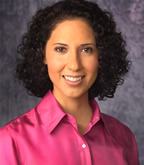Determination Bolstered by Support Can Make the Difference
CSUF Alumna Overcomes Gender Bias in Becoming Engineer
March 12, 2007
By Russ Hudson
How did those few women who managed to overcome societal pressures, stereotyping and other obstacles to becoming engineers manage it?
What was different between them and the girls and women who chose other fields in spite of aptitude and even interest?
After speaking to several, including one Cal State Fullerton alumna who went on to earn a doctorate in mechanical engineering at Stanford, it seems that encouragement and support were key … and sometimes rising to unfair challenges was a powerful motivator, too.
“I studied mechanical engineering here at Cal State Fullerton,” said Judith Segura, who earned bachelor’s degrees in both physics and mechanical engineering in 1994 and completed her doctorate in the same field in 2004. She was the first Mexican-American woman to graduate from Stanford with a doctorate in mechanical engineering, with the specialty of thermosciences.
“When I started at Cal State Fullerton, there were very few female students, and even fewer female faculty in any of the engineering disciplines, mechanical, electrical or civil. I asked one of the guys in my class why there were so few women in mechanical engineering. He said it was too hard,” Segura recalled.
“I was a French major at the time, and his response was part of the reason I decided to study mechanical engineering. Then, when I earned my degree at Fullerton, a professor told me I should not go to Stanford. He thought I might not make it,” Segura said.
“It’s still tough dealing with men who are not used to women in the work place,” the alumna said. “For me, though, it’s a bit better because I have a Ph.D. That gets more respect.”
Segura had other obstacles to overcome, as well. Her parents were immigrants from Mexico and had limited education. Because of that, they did not talk about college or graduate school the way some other families would. But they had something else.
“They taught us to value education. Me and my eight siblings. They worked very hard and spent a lot of money to put us through parochial grade school because they thought the education would be better there,” Segura said. “It meant a lot of sacrifices at home. They set up the foundation for us to succeed and were very pleased and supportive of our choices to go on to college and to study engineering.
“My younger sister, Betty, studied mechanical engineering at Cal State Fullerton, my brother Ben studied civil engineering at Cornell and my brother David studied mechanical engineering at UC Santa Barbara. The foundation my parents laid for us at great effort worked,” Segura said.
Dorota Huizinga, associate dean of CSUF’s College of Engineering and Computer Science, cited the Society of Women Engineers (SWE) as a force in outreach to girls in area schools, and as a supportive group to women on campus studying engineering. Huizinga praised the student engineering group during a recent address to Women in Philanthropy, “The Obstacle Course Leading to a Career in Engineering and Technology: Gender Inequity in Engineering and Computer Science.”
Christina Diaz, a senior in civil engineering and treasurer of the SWE, said, “It was strange being the only girl in a class, and it happened more than once. But I really wanted to be an engineer, and I had support from my family and from the society members any time it got a little bit hard.”
Liliana Torres, SWE president, seconded it: “You have to really want it to have to deal with being the only girl in class. But SWE helps; we support each other. And, we have a sort of chain. The graduates help us, and we go out and help the girls in the area’s high schools.
“But, really, there isn’t that much negativity, at least not that I’ve experienced,” Torres said. “It helps that I was in sports. It helps the confidence and it helps to go through the sort of rough treatment you get in sports, even if it’s good-natured. It sort of prepares you. And I took auto shop in about the sixth grade, so that was good preparation, too. A lot of the guys were very supportive.”
Krysta Bok, a freshman in mechanical engineering, echoed Torres about participation in sports being good preparation. “Not all the guys are against girls being good in math and science and mechanics during high school and middle school. There is support, too. Maybe things are changing. And I really want to do this.”

